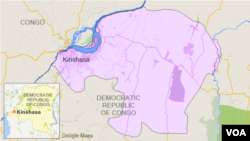Democratic Republic of Congo opposes an international investigation into the deaths of two U.N. investigators, the foreign minister said on Thursday, amid
mounting criticism of the Congolese authorities' own probe.
Congolese military prosecutors announced last weekend that two suspected militiamen would soon face trial for the March killings of U.N. investigators Zaida Catalan, a Swede, and American Michael Sharp in the insurrection-plagued Kasai region.
Rights groups, however, say they suspect Congolese forces could have been involved in the deaths.
A U.N. spokesman on Tuesday cast doubt on the credibility of the Congolese investigation, saying the world body was "taken aback at the rapidity at which it was done."
A U.N. board of inquiry is investigating the experts' deaths but is not expected to assign blame, leading some rights campaigners to call for a formal international investigation.
In a letter to the editor of the New York Times on Thursday, Catalan and Sharp's families also called for an "independent international criminal investigation team to ... help ensure that those responsible face justice".
Congo's foreign minister, Leonard She Okitundu, rejected any such investigation in an interview with Radio France Internationale and accused unnamed U.N. Security Council members of trying to discredit the Congolese justice system.
"Congolese expertise in this matter must be respected," She Okitundu said.
The New York Times had reported on Sunday that Catalan had obtained a recording of a phone call in which ex-development minister Clement Kanku speaks approvingly of violence perpetrated by a local militia to a presumed militia member.
According to the Times, Catalan had informed Kanku she was in possession of the recording. Congo's attorney general said on Tuesday he had opened an investigation into the former minister's possible role in militia violence. Kanku has denied any wrongdoing.
Catalan and Sharp disappeared in March in central Congo's Kasai region, where hundreds have died since last July in an insurrection against the government. Their bodies were found two weeks later in a shallow grave.
Last month, the government screened a video for journalists showing their executions by men wearing red headbands characteristic of the local Kamuina Nsapu militia to rebuff suggestions authorities were complicit in the killings.
But many analysts say the grainy and highly edited video raises more questions than it answers, including why the assassins from the Tshiluba-speaking militia gave orders in Lingala, the language of western Congo and the army.
The investigators' interpreter and three motorcycle taxi drivers who went missing with them have not been found.








